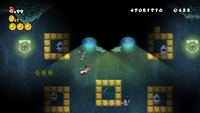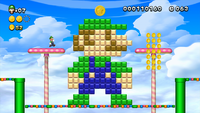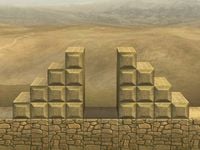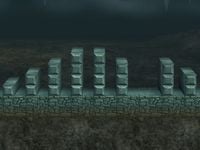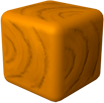Hard Block
It has been requested that more images be uploaded for this article. Remove this notice only after the additional images have been added. Specifics: appearances in the Mario Kart series
- Not to be confused with Stone Block or Rock Block.
| Hard Block | |
|---|---|
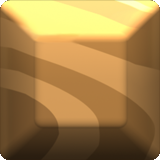 Artwork from Super Mario Maker for Nintendo 3DS | |
| First appearance | Super Mario Bros. (1985) |
| Latest appearance | Nintendo World Championships: NES Edition (2024) |
- “AARGH! I can't hit the ? Blocks because those annoying Hard Blocks are in the way.”
- —Purple Toad, Super Mario Maker 2
A Hard Block (also lowercased)[1] is a type of block commonly used to make stair-like structures and other platforms. Unlike ? Blocks and Brick Blocks, Hard Blocks cannot contain items or coins (with the exception of Super Mario Bros. 3). Mario and Luigi are not normally able to destroy Hard Blocks, but certain methods, such as entering a Mega state or using a Big Thwomp, can be used to destroy them.
History
Super Mario series
Super Mario Bros. / Super Mario Bros.: The Lost Levels
The first Hard Blocks appeared in Super Mario Bros. They are referred to as stairblocks in the companion book How to win at Super Mario Bros.,[2] and their most notable use is to create stairs at the end of many levels leading to the top of the flagpole, which itself has a Hard Block as its base. In some levels, they are used to create much more gently-sloped stairs as a minor obstacle. Stairblocks reappear in Super Mario Bros.: The Lost Levels with an identical appearance and purpose. They are also incorporated into Super Mario Bros. Special.
Super Mario Bros. 3
Hard Blocks also appear in Super Mario Bros. 3, where they are known as Wood Blocks.[3] Some Wood Blocks are bouncy; these blocks bounce Mario or Luigi away if he runs against their sides, and they are sometimes found near pits as an obstacle. Some of these blocks also hold items, releasing them only if they are bumped into or hit with a shell or tail whip (from Raccoon Mario or Tanooki Mario). Chain Chomps are usually found attached to Wood Blocks. Larger inert Wood Blocks appear in the fourth world, Giant Land.
In the GBA version, the Hard Blocks' design from the Super Mario All-Stars version of Super Mario Bros. returns in Classic World 1-1, Classic World 1-2, and Classic World 2-2.
Super Mario World
Hard Blocks, now called Gray Blocks[4] (alternatively gray Blocks[5] or Grey Blocks[6]), appear once again in Super Mario World with a different redesign, this time resembling blocks of stone. They reprise their purpose from previous games.
Super Mario Sunshine
Hard Blocks (localized as orange blocks)[7] primarily appear in secret courses as platforms and barriers. Many are of atypical shapes (i.e., rectangular or triangular prisms) depending on their purpose. Some shift back and forth. Thin variants that function like trampolines appear in The Secret of the Dirty Lake and The Beach Cannon's Secret.
New Super Mario Bros.
Hard Blocks reappear in New Super Mario Bros. at the end of most levels. Like in Super Mario Bros., they are often used as a staircase to reach the flagpole. The flagpole itself has a new fortress-styled base instead of a Hard Block. If Mario gains a Mega Mushroom and turns into Mega Mario, he can destroy Hard Blocks simply by running into them. Volcanic debris can also destroy Hard Blocks.
New Super Mario Bros. Wii
Hard Blocks reappear in New Super Mario Bros. Wii. In World 8-4, a Star Coin and several Bloopers are found caged within Hard Blocks, which can be destroyed by pressing a nearby ? Switch. Hard Blocks also appear in World ![]() Coin-2, a remake of World 1-1 in Super Mario Bros.
Coin-2, a remake of World 1-1 in Super Mario Bros.
Super Mario 3D Land
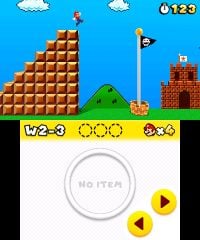
Wood Blocks from Super Mario Bros. 3 return in Super Mario 3D Land, where they are usually twice as large (like those in Giant Land) and have a more yellow color, though none contain any items. Stairblocks from Super Mario Bros. return at the ends of World 2-3 and Special 1-3, once again as staircases near the courses' Goal Poles.
New Super Mario Bros. 2
While wooden and stone Hard Blocks return, golden and colored Hard Blocks make their debut in New Super Mario Bros. 2. Pink, green, blue, orange, beige, brown, gold, black, light blue, red and yellow are the only known colors.
New Super Mario Bros. U / New Super Luigi U / New Super Mario Bros. U Deluxe
Hard Blocks return in New Super Mario Bros. U, referred to as stone blocks.[8] Colored stone blocks also appear in New Super Luigi U, used mostly for decoration, or to make pixel art such as 8-bit Luigis, a common Easter egg in the game.
Super Mario Maker / Super Mario Maker for Nintendo 3DS
In Super Mario Maker and its 3DS version, all four designs of the Hard Blocks based on the four level styles appear. They can be destroyed by strong enemies, including Big Koopa Troopa shells, Big Thwomps, Bob-ombs, Magikoopas' magic attacks, Skewers, and Bowser. A new method of breaking Hard Blocks is firing a fully charged shot from a Fire Koopa Clown Car. They can also be destroyed by Big Mario.
Super Mario Maker 2
Hard Blocks also appear in Super Mario Maker 2. They have the same functionality as they did in Super Mario Maker, except that they cannot be broken by Big Mario from the side. Link's bombs can now also destroy Hard Blocks. Giant Spiked Balls, a big Blasta Mechakoopa's missile explosion, a big Zappa Mechakoopa's laser beam, and Ground Pounds from some Koopalings can destroy Hard Blocks. They can also be given wings, and when playing a course, they will fly a few blocks left, then fly twice as many blocks right, then fly that many blocks left, and repeat the last two actions. Hard Blocks can also stop the screen from scrolling, so it is possible to make a course that requires breaking Hard Blocks stopping the screen from scrolling to advance.
In the Super Mario 3D World style, they take the form of Rock Blocks. If the player uses the Super Hammer, they can break these blocks with a hammer swing. They can also be broken by Banzai Bills, a Porcupuffer's explosion from fireballs, and Big Bullies.
Super Mario Bros. Wonder
- “A Bulrush will smash right through hard blocks! You may need to help show it which way to go though.”
- —loading-screen tip
There is a variety of different hard blocks in Super Mario Bros. Wonder themed to the levels they occur in. In Pipe-Rock Plateau, the hard blocks are made of wood. In underwater levels, they are made of coral. Though normally indestructible, hard blocks can be broken by strong enemies, such as Bulrushes and Smackerels. In Gnawsher Lair, the hard blocks are colored like candy and are eaten by Gnawshers.
Mario Kart series
Hard Blocks have appeared in the Mario Kart series with either their Super Mario Bros. appearance, or as colored blocks that border Mario Circuit.
Super Smash Bros. series
Super Mario Bros.-styled Hard Blocks appear throughout the Super Smash Bros. series.
The Mushroom Kingdom stage in Super Smash Bros. and the Mushroom Kingdom stage in Super Smash Bros. Melee feature the blocks' classic staircase arrangement in the background. The former also has pass-through platforms made of Hard Blocks (Empty Blocks in Ultimate).
In Super Smash Bros. Brawl, Super Smash Bros. for Nintendo 3DS, and Super Smash Bros. Ultimate, Hard Blocks appear as part of the Mushroomy Kingdom stage. They are arranged just as in World 1-1 (and in Brawl only, World 1-2) of Super Mario Bros. However, they now appear worn, chipped, and cracked, matching the stage's ruined appearance. The block the flagpole stood on in World 1-1 is gone, but only in Brawl and for 3DS; it is in the background in Ultimate. Additionally, Hard Blocks also form the top two layers of the stage's Final Destination form in Super Smash Bros. for Nintendo 3DS, and the Battlefield form's platforms in Super Smash Bros. Ultimate.
Mario Clock
In Mario Clock, Hard Blocks appear using their Super Mario Bros. design as the terrain of the bridge stage theme.
Nintendo Badge Arcade
Hard Blocks also appear as badges in Nintendo Badge Arcade. The Super Mario Bros. Hard Blocks appear as part of the Super Mario Bros. set, while Gray Blocks appear as part of the Super Mario Maker set.
Gallery
- For this subject's image gallery, see Gallery:Hard Block.
Super Mario Bros. (underground)
Super Mario All-Stars (Super Mario Bros. 3)
Names in other languages
Hard Block
| Language | Name | Meaning | Notes |
|---|---|---|---|
| Japanese | 硬いブロック[?] Katai Burokku |
Hard Block | |
| Chinese (simplified) | 坚硬砖块[?] Jiānyìng Zhuānkuài |
Hard block | |
| Chinese (traditional) | 堅硬磚塊[?] Jiānyìng Zhuānkuài |
Hard block | |
| Dutch | Hard blok[?] | Hard Block | |
| French (NOE) | Bloc solide[?] | Solid block | |
| Italian | Blocco duro[?] | Hard block | |
| Korean | 딱딱블록[?] Ttakttak Beullok |
Hard Block | |
| Portuguese | Bloco sólido[?] | Solid block | |
| Russian | Прочный блок[?] Prochnyy blok |
Solid Block | |
| Spanish (NOA) | Bloque duro[?] | Hard block |
Wood Block
| Language | Name | Meaning | Notes |
|---|---|---|---|
| Japanese | 木目ブロック[9] Mokume Burokku |
Woodgrain Block |
Stone block
| Language | Name | Meaning | Notes |
|---|---|---|---|
| Japanese | 石ブロック[10] Ishi Burokku |
Stone Block |
References
- ^ "A Bulrush will smash right through hard blocks! You may need to help show it which way to go though." – Tip (20 Oct. 2023). Super Mario Bros. Wonder by Nintendo EPD (North American Localization). Nintendo of America. Retrieved 27 Nov. 2024.
- ^ Sase, Shinji, Howard Phillips, and Lynn Griffes, editors (1987). How to win at Super Mario Bros. (U.S. Edition). Redmond: Tokuma Shoten, Nintendo of America. ISBN 4-19-720003-XC. Page 7.
- ^ Peterson, Erik (2003). Super Mario Advance 4: Super Mario Bros. 3 Player's Guide. Nintendo of America (American English). ISBN 1930206-37-2. Page 31.
- ^ August 1991. Nintendo Mario Mania Player's Guide. Nintendo of America (American English). Page 71, 89, 108, 153.
- ^ August 1991. Nintendo Mario Mania Player's Guide. Nintendo of America (American English). Page 57.
- ^ August 1991. Nintendo Mario Mania Player's Guide. Nintendo of America (American English). Page 73.
- ^ Averill, Alan, and Jennifer Villarreal (2002). Super Mario Sunshine Player's Guide. Redmond: Nintendo of America (American English). ISBN 1-930206-23-2. Page 73.
- ^ "Find the pipe hidden in the ceiling next to the sign. Once inside, use the Screwtop Platform to guide the Grrrols into the stone blocks. When the way opens, grab that coin!" – New Super Mario Bros. U Channel (December 27, 2012). New Super Mario Bros. U -- Third Star Coin in Stoneslide Tower. YouTube. Retrieved May 23, 2022.
- ^ October 19, 2015. Super Mario Bros. Hyakka: Nintendo Kōshiki Guidebook, Super Mario Bros. 3 section. Shogakukan (Japanese). ISBN 978-4-09-106569-8. Page 41.
- ^ October 19, 2015. Super Mario Bros. Hyakka: Nintendo Kōshiki Guidebook. Shogakukan (Japanese). ISBN 978-4-09-106569-8. Page 118, 149, 199, 215.
- Blocks
- New Super Mario Bros. objects
- New Super Mario Bros. 2 objects
- New Super Mario Bros. U objects
- Super Mario 3D Land objects
- Super Mario Advance 4: Super Mario Bros. 3 objects
- Super Mario Bros. objects
- Super Mario Bros. 3 objects
- Super Mario Bros.: The Lost Levels objects
- Super Mario Bros. Wonder objects
- Super Mario Maker objects
- Super Mario Maker 2 objects
- Super Mario Sunshine objects
- Super Mario World objects
